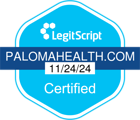In this article:
Treating Hashimoto’s thyroiditis can be complicated. If your thyroid isn’t producing enough hormones, it requires the right thyroid hormone replacement medication as well as diet and lifestyle modifications. People with Hashimoto’s commonly have other autoimmune conditions which can make managing Hashimoto’s more challenging, even when you are following the right treatment plan. A growing number of patients living with Hashimoto’s find that taking naltrexone along with their thyroid hormone replacement therapy helps manage their autoimmune conditions.

Dealing with Hypothyroidism? Video chat with a thyroid doctor
Get answers and treatments in minutes without leaving home - anytime. Consult with a U.S. board certified doctor who only treats hypothyroidism via high-quality video. Insurance accepted.
Schedule
Naltrexone is a medication typically given to people who struggle with alcohol and opioid drug dependence. When dosed in higher amounts, naltrexone attaches to opioid receptors (“Mu”) to block the pleasurable effects of taking opioid drugs or drinking alcohol. People who drink alcohol or use opioid drugs while taking naltrexone can get very ill, which further decreases their desire to use these substances.
In lower doses, however, naltrexone sometimes helps to manage autoimmune conditions. Low-dose naltrexone (LDN) is used as an immunomodulator to help people who suffer from autoimmune disorders like Crohn’s disease, multiple sclerosis, lupus, psoriasis, and rheumatoid arthritis. Research on this drug has even been promising in suppressing cancerous tumors as well.
Most patients with autoimmune diseases begin their treatment with a very low dose starting at 0.5mg and will increase to about 4.5mg as tolerated. These dosages compare to the 50mg dose prescribed to treat drug or alcohol use. The drug titrates up carefully based on your thyroid hormones, TPO antibody levels, and how you feel.
Medical providers have been prescribing low-dose naltrexone for autoimmune conditions since the 1980s. However, using naltrexone in autoimmune conditions is considered an off-label use of this drug because there are few large clinical trials and standardized experiments studying this drug and its use in people with autoimmune diseases. Most studies conducted on using low-dose naltrexone for autoimmune conditions are on people with Crohn’s disease.
Hashimoto’s thyroiditis is an autoimmune condition where your immune system attacks the cells in your thyroid gland. This constant attack on your thyroid gland causes inflammation (or chronic lymphocytic thyroiditis). Chronic inflammation leads to an underactive thyroid or hypothyroidism.
Hashimoto’s is slow to progress, but often people begin to suffer from many of the same symptoms as people with non-autoimmune hypothyroidism. LDN may help reduce the severity of these symptoms.
The exact mechanism for how low-dose naltrexone works in autoimmune conditions is not well understood. LDN may help suppress inflammatory cytokines that cause inflammation of the thyroid gland. This drug may turn off the cellular mechanisms that cause autoimmune processes. By decreasing inflammation and suppressing the autoimmune response, cells in the thyroid may be able to produce more thyroid hormone and return the gland to a euthyroid (normal) state.
The drug may also increase endorphins. People with autoimmune conditions may have lower levels of endorphins, which could contribute to some common symptoms across most autoimmune conditions, including fatigue, pain, and overall lethargy.
While no scientific studies look directly at the relationship between low-dose naltrexone and Hashimoto’s, some anecdotal evidence from clinicians and patients suggests that LDN may improve Hashimoto’s symptoms and may even lower TPO antibodies. Many patients have tried LDN and have not had any improvement in their symptoms or their thyroid labs.
Fortunately, the reported side effects of low-dose naltrexone are rare and mild. In general, most people tolerate LDN well.
Some known possible side effects of low-dose naltrexone include:
- Headaches
- Stomach upset (nausea, vomiting, diarrhea, decreased appetite)
- Insomnia
- Anxiousness
- Dizziness
- Increased muscular contraction
- Joint pain
- Fatigue
Anecdotal evidence from a few people found that their autoimmune symptoms worsened when they started taking LDN.
Low-dose naltrexone is a promising treatment option for people living with autoimmune disorders, including Hashimoto’s. Many people with Hashimoto’s have found that LDN improves their symptoms, including fatigue, lethargy, and aches and pains. However, research is lacking to support using LDN in people with Hashimoto’s.
LDN is not a cure for Hashimoto’s. Indeed, there is no cure for Hashimoto’s at this time, but there are effective treatment options for managing this condition. Hashimoto’s that causes hypothyroidism can be treated with proper thyroid hormone replacement medication and diet and lifestyle changes.
LDN might be an adjunct to thyroid medications. Using low-dose naltrexone in patients with Hashimoto’s is considered an off-label use of the drug, so some providers may choose not to prescribe LDN.
A note from Paloma Health
More scientific research is needed to understand how low-dose naltrexone can specifically help people with Hashimoto’s disease. If you are interested in trying low-dose naltrexone in addition to your thyroid hormone replacement medication, talk with your doctor to determine if it's right for you.

.webp)

.webp)












